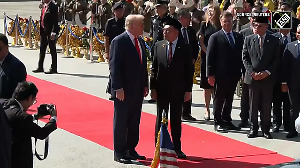Asserting that the Bharatiya Janata Party stood for secularism, party president Rajnath Singh has said that all BJP-ruled states have been asked to bring stringent anti-conversion law to protect demographic balance in the country.
"India is a secular state, and BJP never hates human beings," Singh said, alleging that the Congress-led United Progressive Alliance government was not concerned with Muslims as human beings, but was treating the community as a vote bank.
"This reflects in its minority reservation policy. We are not opposed to reservation on economic and social backwardness, but we are opposed to appeasement politics which the Congress is embarked on," the former Uttar Pradesh chief minister said.
On Monday evening as the Bharat Suraksha rath rolled on a stretch of 250 km from Gumla to Ranchi, which has a substantial presence of missionaries, Singh quoted a private survey report that claimed there was a threat of demographic change by 2060 if steps were not taken against 'forced conversion.'
"We do not object missionaries serving the poor, but let there not be any business in the name of service. The BJP governments have been asked to move bills outlining stringent punishment in the event of forced conversion.... Rajasthan has made the opening with such a law recently, and other states will soon follow suit," he added.
Singh accused the Manmohan Singh regime of not taking any concrete step to protect the borders from intrusion by Bangladeshi nationals to maintain demographic balance.
"BJP will not allow the country lose its identification through intrusions and conversions. We are ready to meet any challenge to retain the nation's identity," he added.
The yatra, he said, would also seek public opinion as to why India lagged behind and could not break into the league of developed countries though the Congress ruled the country for over four decades.
Expressing concern over the naxalite problem, Singh said the Centre should not leave the problem for the states to solve. "It should convene a chief ministers' meeting and take the states into confidence to draw out an integrated plan."




